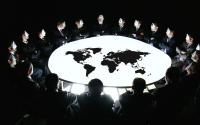Published on Thursday, September 4, 2003 by the New York Timesby Christopher Marquis
Europeans are increasingly uncomfortable with the United States' global leadership, with majorities in almost every nation opposing the direction of American foreign policy, a new poll has found.
The survey, conducted by the German Marshall Fund of the United States and Compagnia di San Paolo of Turin, Italy, collected views on both sides of the Atlantic about international threats, global leadership and the use of force to resolve conflicts.
The survey offers a snapshot of changing attitudes since the Bush administration, frustrated by some European resistance to war, led a coalition to battle in Iraq without the authorization of the United Nations Security Council. President Bush said on Tuesday that he would seek United Nations' help to strengthen military forces in Iraq.
The difference between American and European attitudes is widening, the poll found, as longtime allies of the United States increasingly chafe under American leadership.
"The trans-Atlantic split over war in Iraq has undermined America's standing with Europeans," the survey's authors said.
In Italy and Germany, for example, disapproval of current American foreign policy has surged by 20 percentage points from last year, according to the poll, which sampled the views of 8,000 Americans and Europeans in June.
The survey was conducted in the United States and seven other countries - Germany, France, Britain, Italy, the Netherlands, Poland and Portugal - and has a margin of error of three percentage points.
While a firm majority of European respondents - 64 percent - last year favored a strong American presence in the world, that number dropped to 45 percent this year. In France, 7 of 10 respondents said American global leadership was "undesirable," and half the Italians and Germans agreed.
Americans are more likely than Europeans to embrace the use of force to rid nations of dangerous weapons, and are more willing to circumvent the United Nations if their vital interests are at stake, the poll found.
For example, on North Korea, 63 percent of Americans support using force to keep that nation from acquiring weapons of mass destruction. By contrast, only 37 percent of Europeans supported such an attack. North Korea upset nuclear disarmament talks last month by stating its intention to test a nuclear bomb.
Nearly three out of four Americans - 73 percent - would endorse the use of force to keep Iran from getting biological, chemical or nuclear weapons. But fewer than half of Europeans - 44 percent - said they would support military action to disarm Iran.
On the Middle East, both Americans and Europeans seemed willing to exert pressure on Israel to reach a peace agreement with the Palestinians. But Americans were much more inclined to withhold aid to the Palestinian Authority in order to end suicide attacks, with 72 percent favoring such action. A bare majority of Europeans, 52 percent, supported such action, the poll found.
Asked whether war can be viewed as just, Americans overwhelmingly assented, at 84 percent. But Europeans were more skeptical; only 48 percent responded that war may be used to achieve justice.






